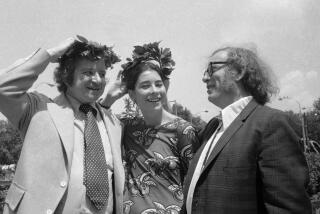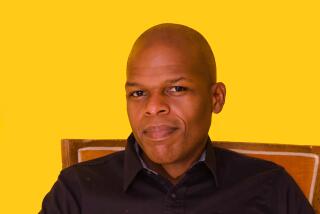Louis Rubin dies at 89; author, publisher dedicated to Southern prose
Louis D. Rubin Jr., a curmudgeonly patron of contemporary Southern writing who as an author, teacher, editor and publisher helped establish and advance the careers of John Barth, Annie Dillard and dozens of others, has died. He was 89.
Rubin died Nov. 16 at a retirement home in Fearrington, N.C., said his wife, Eva Redfield Rubin.
A Charleston, S.C., native, Rubin mentored and published Southern writers. He taught such future stars as Barth, Dillard and Kaye Gibbons and, through Algonquin Books of Chapel Hill, N.C., published fiction by Clyde Edgerton, Jill McCorkle, Lee Smith and many more.
A former journalist, Rubin wrote novels, critical studies, histories, memoirs and even a guide for predicting the weather. He started or co-started such influential publications as the Hollins Critic and the Southern Literary Journal. Algonquin Books, cofounded in 1983 by Rubin and Shannon Ravenel, has been an invaluable resource for writers overlooked by New York editors.
In 2005, the National Book Critics Circle presented Rubin with a lifetime achievement award.
He was as much a presence in person as on the page, a case study for the word “rumpled,” an impulsive yeller and selective smiler who wore hearing aids that friends swore broke down when conversation turned tiresome.
“He’s tireless, loyal, gruff and a genius, really,” Ravenel once said of Rubin, who left Algonquin in 1992. (Algonquin had been bought out in 1989 by New York-based Workman Press.)
Born Nov. 19, 1923, Louis Decimus Rubin Jr. was a descendant of Russian Jews and by age 10 had already written a play, and he acquired a typewriter soon after. He graduated with a degree in history from the University of Richmond and worked for the Associated Press and newspapers including the Richmond News Leader before starting his graduate studies at Johns Hopkins University.
As a teacher at Hollins College, and later at the University of North Carolina at Chapel Hill, Rubin drew such established authors as Howard Nemerov and William Golding as instructors and had a gift for spotting talent among his students.
“If this be elitism, make the most of it,” he wrote in the essay “What Are All Those Writers Doing on Campus?”
Ravenel, a self-described “Rubin groupie,” was a Hollins student when Rubin joined the faculty. After she graduated, he helped her find work as an editor with Houghton Mifflin and sent her manuscripts by promising writers.
In a letter to Ravenel written in the early 1980s, Rubin declared the imminent death of literary fiction in New York City. He called for a new publisher, based in the South and run, with Ravenel’s help, by Rubin.
“I don’t mean regional or experimental avant-garde stuff, but simply the best fiction (and nonfiction) I can locate,” wrote Rubin, who named the company Algonquin, not after the New York hotel but after a passenger ship he remembered from childhood.
The company started in his study, expanding to his living room, then a bedroom, a porch and finally his backyard woodshed. The initial editors all were former Rubin students. They worked together and truly played together, forming the Algonquin Bluegrass Band, with Rubin on harmonica.
Rubin’s passions also included baseball, boats, trains and his Jewish roots, all duly documented in his own books, including “Small Craft Advisory,” “Babe Ruth’s Ghost” and “A Memory of Trains.” The memoir “An Honorable Estate,” published in 2001, covers his years in journalism. “My Father’s People,” which came out in 2002, is a dry-eyed reflection on his immigrant ancestors.
“Nostalgia is an impoverishing emotion; it robs our memory of all its complexity,” Rubin wrote in the prologue. “I hope I have avoided it.”
Besides his wife of 62 years, Rubin is survived by two sons, two grandchildren, a brother and a sister.
More to Read
Start your day right
Sign up for Essential California for the L.A. Times biggest news, features and recommendations in your inbox six days a week.
You may occasionally receive promotional content from the Los Angeles Times.






